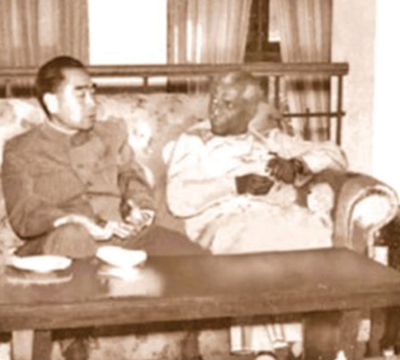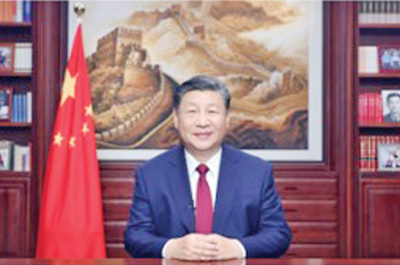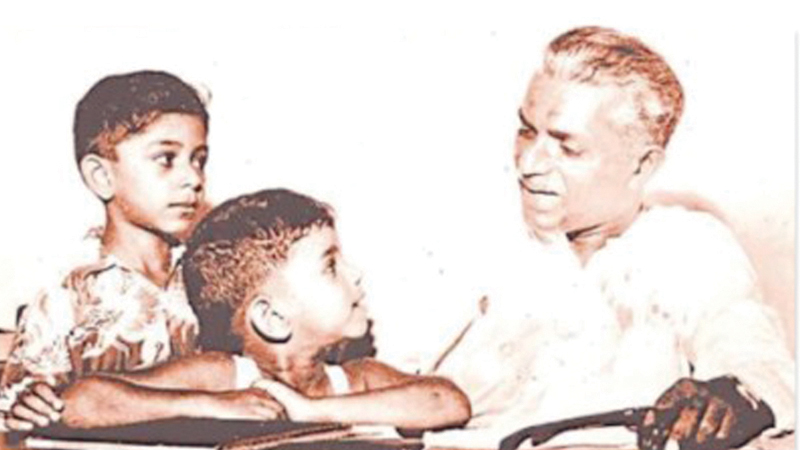Leftist leaders of Sri Lanka established close affinity with the socialist leaders across the world in the second quarter of the last century. The ‘Father of Marxism of Ceylon’, Philip Gunawardana was a signatory to the Paris Declaration of the socialist youths in 1929, and the fellow comrades who signed the pact included Chou En-Lai of China, Ho Chi Minh of Vietnam and several leftist leaders of Colombia, France, Spain, United States and India.
The death anniversary of Philip Gunawardena falls on Tuesday (March 26) and it is of interest to analyse his close connections with China as his son current Prime Minister Dinesh Gunawardena is schedule to undertake an official visit to Beijing where he will meet top Chinese leaders including President Xi Jinping and Prime Minister Li Qiang.

October 1, 1958, Premier Zhou Enlai with Philip Gunawardana at the Sri Lanka Embassy in Beijing, China
Philip Gunawardena launched the Lanka Sama Samaja Party (LSSP) together with N. M. Perera, Colvin R. de Silva and other pioneers of the Left Movement in 1935. Although it was based on the doctrine of socialism, Philip realised soon that the foreign doctrine will have to be transformed to meet the people’s aspirations. Hence, he launched the new vision of ‘National Socialism’ loosely translated as ‘Jathika Samajavadaya’.
He succeeded in blending Trotskyism with Nationalism, rather than totally devoting his vision to Marxist theories. Hence, it was easy for his Social Nationalism to blend with S.W.R.D. Bandaranaike’s middle path and the new Pancha Maha Balawegaya of the Buddhist clergy, indigenous physicians, teachers, peasants and labourers that resulted in forming the Mahajana Eksath Peramuna (MEP) to capture power in 1956.
In 1958, when Philip visited China as a prominent member of the Cabinet, Chinese Prime Minister Zhou En Lai set aside diplomatic protocols, visited the Embassy of Ceylon to meet the visiting Minister, who was a longstanding friend and socialist comrade.
Opportunity
Incidentally, the Chinese Premier was accompanied by Xi Zhong Xun, the father of President Xi as he was the Secretary General of the Prime Minister. Zhon Xun worked for Premier Zhou from 1953 – 1963.
When Prime Minister Dinesh Gunawardena meets President Xi Jinping this week, they get an opportunity to exchange pleasantries and talk about the 1958 meeting of their fathers’.
Philip was alive to the need for flexibility for the sake of serving the interests of the masses early in his political career. As eminent civil servant and academic-turned politician Dr. Sarath Amunugama said the idea of social justice was at the heart of Philip, who valued equality not as an end point but rather the point of departure for social transformation.
On Socialism itself Philip had a different perspective from the red-shirted comrade shouting himself hoarse on May Day: “You talk of Socialism. You cannot socialise poverty. You can only socialise plenty. And if people cannot work, if they cannot produce, you cannot have Socialism.”
This was probably an admonition to the Government of the day which was claiming to be Socialist.

President Xi Jinping
Philip was largely instrumental in disseminating the idea of Socialism in Sri Lanka.
He did so in his unique way by de-Europeanising Socialist thought and by connecting it to the wellsprings of indigenous culture and investing it with local resonances.
He was able to speak in the cultural idiom of the people regarding issues that mattered most to them. Looking back on his efforts, one has to conclude that this was indeed the correct strategy, Dr. Amunugama said.
Prof. A.V.D.S. Indraratne, the prominent economist, taking a look at Philip’s achievements, said that he brought Marxism to the rural peasants through his Jathika Samajavadaya.
Danger
Speaking in the course of the Budget debate on October 11, 1960, Philip, then a member of the Opposition, said, “In our country with its accent on political illiteracy, there is the danger of a class struggle between the ignorant and the educated.
The modern world is a complex world; its technological problems need a cultivated understanding. The fact that new ideas and learning mostly come to our country through a foreign language creates new barriers between the educated elite and the unsophisticated people.
The new ideas and learning do not naturally seep down, fail to become a part of the heritage and the consciousness of the people and they remain a monopoly of the new Nationalisation of modern knowledge which is the sine qua non of effective democracy and Socialism in our country.”
The relevance of Philip’s vision is evident from the fact that Philip was a modernist, and was acutely conscious of the fact that the path to progress in Sri Lanka lay through modern technology and not through a mere change of property relations through violent revolution or otherwise.
Quarrel
While Philip stressed the importance of modern knowledge and technology he did not belittle the value of culture. During the course of a speech, he said: “A Spanish proverb says that there is a constant quarrel between beauty and chastity. Let there not be a similar quarrel between socialism and culture. The socialist is an heir to the varied cultures of the past; to abandon the heritage is to make socialism as unreal as the shell grit sea.”
“The future belongs to the trained and the technocrats, not to the foreman,” Philip once said in Parliament. At the same time he stressed the importance and dignity of labour. “A world to the middle classes – the educated and enlightened sections of our population. Your developing hostility to the working class is not only short-sighted but self-destructive. May I respectfully appeal Mr. Speaker, to the middle classes to stop turning the single beads of irritation into a rosary of despair.”




